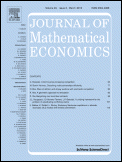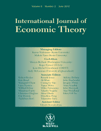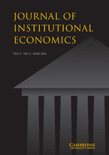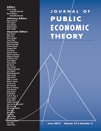
JOURNAL OF INSTITUTIONAL AND THEORETICAL ECONOMICS-ZEITSCHRIFT FUR DIE GESAMTE STAATSWISSENSCHAFT
Scope & Guideline
Innovating discourse in theoretical and institutional economics.
Introduction
Aims and Scopes
- Institutional Economics:
The journal emphasizes the role of institutions in shaping economic behavior, exploring how legal, political, and social frameworks impact economic transactions and market dynamics. - Empirical Legal Studies:
A significant focus is placed on empirical research methodologies to examine legal institutions and their economic implications, making use of quantitative and qualitative analyses. - Behavioral Economics:
The journal explores how psychological factors and social preferences influence economic decision-making, particularly in the context of contracts and market interactions. - Contract Theory:
Research on relational contracts, incentive structures, and contractual incompleteness is prevalent, addressing how contracts are formed, enforced, and renegotiated in various contexts. - Market Dynamics and Competition:
The journal investigates competitive behaviors in markets, including collusion, price discrimination, and the effects of corporate social responsibility, contributing to the understanding of market power and efficiency. - Interdisciplinary Approaches:
The journal encourages interdisciplinary research, integrating insights from economics, law, sociology, and political science to provide comprehensive analyses of complex economic issues.
Trending and Emerging
- Artificial Intelligence and Law:
There is a notable increase in research exploring the intersection of AI technologies and legal frameworks, focusing on implications for empirical legal studies and judicial decision-making. - Relational Contracts and Governance:
Emerging discussions around relational contracts highlight the importance of social relationships and informal agreements in economic transactions, reflecting a shift towards understanding the nuances of contract enforcement. - Sustainability and Corporate Social Responsibility (CSR):
The journal is increasingly publishing works that examine the economic implications of sustainability practices and CSR, indicating a trend towards understanding the long-term impacts of corporate behavior on society. - Behavioral Insights in Legal Decision-Making:
There is a growing body of research focusing on how cognitive biases and behavioral factors influence judicial decisions, which aligns with broader trends in behavioral economics. - Data Analytics and Market Research:
Papers utilizing advanced data analytics to inform economic and legal research are on the rise, reflecting a trend towards empirical studies that leverage big data for better insights into market dynamics.
Declining or Waning
- Traditional Public Finance:
Research on conventional public finance topics, such as taxation and government expenditure, has become less frequent, possibly overshadowed by more contemporary analyses of institutional impacts on economic behavior. - Labor Market Dynamics:
While still relevant, studies specifically focused on traditional labor market theories and dynamics are appearing less often, as newer themes like relational contracting and behavioral aspects gain more attention. - Static Economic Models:
There has been a noticeable decline in the publication of static models that do not incorporate institutional or behavioral dimensions, indicating a shift towards more dynamic and context-sensitive economic analyses. - Conventional Competition Theory:
Traditional models of competition that do not consider the role of institutional factors or behavioral insights are becoming less prominent, as the journal increasingly prioritizes studies that integrate these aspects. - Experimental Economics:
The frequency of papers employing experimental methods without a strong theoretical or institutional framework has waned, as the journal favors research that combines empirical findings with robust theoretical contributions.
Similar Journals

JOURNAL OF MATHEMATICAL ECONOMICS
Exploring the Intersection of Numbers and Markets.JOURNAL OF MATHEMATICAL ECONOMICS, published by Elsevier Science SA, is a premier journal that bridges the gap between mathematics and economics, making significant contributions to both fields since its inception in 1974. This journal is dedicated to publishing high-quality research that applies mathematical methods to solve complex economic problems, thus nurturing an interdisciplinary dialogue essential for advancing both theoretical and practical applications in economics. With an impact factor that reflects its esteemed position (Q2 in Applied Mathematics and Economics and Econometrics as of 2023), the journal ranks prominently within its categories, promoting rigorous analysis and innovative methodologies. The Journal of Mathematical Economics invites contributions from researchers, professionals, and students alike, providing a platform for the dissemination of cutting-edge research that shapes economic thought and policy. Operating without open access, it remains a crucial resource for anyone keen to delve deeper into the mathematical foundations of economic theory, while it continues to evolve and maintain relevance through 2024 and beyond.

Panoeconomicus
Connecting Scholars to Transform Economic UnderstandingPanoeconomicus is a renowned academic journal published by SAVEZ EKONOMISTA VOJVODINE, specializing in the evolving fields of Economics, Econometrics, and Finance. Since its inception as an Open Access publication in 2006, this journal has fostered a collaborative environment for scholars and practitioners to disseminate research that contributes to critical economic discourses. Based in Serbia, and operating within an international context, Panoeconomicus carries an impressive Scopus Rank in the 57th percentile, further reflected in its Q3 category quartile for Economics, Econometrics, and Finance as of 2023. With a commitment to enhancing academic dialogue through readily accessible content, the journal is instrumental in shaping new insights and methodologies available to researchers, finance professionals, and students alike. Its significance in the field continues to grow, particularly as it addresses pressing economic challenges from 2009 to 2024 and beyond, making it a valuable resource for those aiming to stay at the forefront of economic research.

Homo Oeconomicus-Journal of Behavioral and Institutional Economics
Unpacking the Complexities of Economic BehaviorHomo Oeconomicus - Journal of Behavioral and Institutional Economics is a reputable academic journal published by Springer Heidelberg, dedicated to exploring the intersection of behavioral science and institutional economics. With its ISSN 0943-0180 and E-ISSN 2366-6161, the journal aims to disseminate high-quality research articles that bridge theoretical constructs and practical applications in economic behavior and institutional frameworks. It offers a vital platform for researchers, professionals, and students to engage with cutting-edge debates, innovative methodologies, and empirical analyses that inform our understanding of economic decision-making processes. Although currently not an open-access journal, Homo Oeconomicus remains influential in shaping the academic discourse within its field, making it essential reading for those passionate about economics, social science, and related studies. For further insights and contributions, subscribe to this pivotal journal, and join the conversations that are redefining economic principles in contemporary society.

ECONOMIST-NETHERLANDS
Empowering Researchers in the Dynamic World of EconomicsThe Economist-Netherlands, published by Springer, is a prestigious journal that has been a cornerstone in the field of economics since its inception in 1852. With a strong focus on disseminating high-quality research and insights, this journal serves as an essential resource for economists, researchers, and practitioners interested in the dynamic landscape of economic theory and applications. Currently ranked in the Q3 category in Economics and Econometrics, this journal demonstrates a commitment to scholarly rigor, as reflected in its Scopus ranking within the 55th percentile. The journal features an extensive scope that encompasses key topics relevant to both historical and contemporary economic challenges, fostering a vibrant academic discourse. While access is not open, the journal remains a vital publication for anyone seeking to advance their knowledge in the economic sector. With an enduring legacy, the Economist-Netherlands continues to contribute significantly to the evolution of economic scholarship.

Economics of Governance
Connecting Governance Structures with Economic Outcomes.Economics of Governance (ISSN: 1435-6104; E-ISSN: 1435-8131) is a distinguished journal published by SPRINGER HEIDELBERG, dedicated to advancing the field of governance economics. Established in 2003, this journal explores the intricate relationships between governance structures and economic performance, making it a vital resource for researchers, practitioners, and policymakers alike. With its impressive categorization in Q3 in Business and International Management and Q2 in Economics, Econometrics, and Finance (miscellaneous) as of 2023, it stands as a prominent platform for innovative research. Although it operates without open access, it attracts a robust readership owing to its critical analyses and high-quality contributions, fostering an understanding of governance mechanisms in a globalized economy. The journal also receives recognition within Scopus, ranking #139 in General Economics and #323 in Business and International Management, reflecting its influence in shaping current discourse and research trends. For those devoted to the economics of governance, this journal is a crucial asset that continually encourages scholarly inquiry and professional development.

American Economic Journal-Microeconomics
Pioneering Research at the Intersection of Theory and PracticeAmerican Economic Journal-Microeconomics, published by the American Economic Association, is a leading journal in the field of economics, focusing on microeconomic theory and its applications. With an ISSN of 1945-7669 and an E-ISSN of 1945-7685, this esteemed journal has established itself as an essential resource for researchers, professionals, and students alike, particularly noted for its Q1 ranking in the Economics, Econometrics and Finance category for 2023, placing it in the top tier of its field. The journal has continuously fostered academic excellence since its inception in 2009, and it provides a platform for innovative and rigorous research addressing contemporary microeconomic issues. With its high impact factor and robust Scopus ranking (Rank #82/288), the journal serves as a critical contributor to the advancement of microeconomic knowledge and practice. Explore groundbreaking research and insights as the journal spans a diverse range of topics, dedicated to the ongoing development of the discipline through high-quality, peer-reviewed articles.

JOURNAL OF ECONOMICS AND FINANCE
Advancing economic insights and financial innovations.JOURNAL OF ECONOMICS AND FINANCE, published by SpringerNature, is a leading academic journal that has been addressing critical issues in the fields of economics and finance since its inception in 1992. With an ISSN of 1055-0925 and an E-ISSN of 1938-9744, this journal offers scholars a platform to share their groundbreaking research and insights, contributing to the advancement of economic theory and financial practices. Although it operates under a traditional access model, the journal maintains a reputable standing within the academic community, evidenced by its 2023 Quartile ranking of Q3 in both Economics and Econometrics as well as Finance. Its Scopus ranking further reflects its relevance, securing positions of #355/716 and #159/317 in the respective categories. The journal aims to foster a comprehensive understanding of economic dynamics and financial innovations, making it an invaluable resource for researchers, educators, and practitioners who seek to explore contemporary trends and challenges within these disciplines.

International Journal of Economic Theory
Advancing economic thought for a global audience.International Journal of Economic Theory, published by Wiley, serves as a vital platform for scholars and researchers in the fields of economics and econometrics. With its ISSN 1742-7355 and E-ISSN 1742-7363, this journal focuses on advancing theoretical understandings in economics, providing a comprehensive analysis of contemporary economic issues. The journal has been converging knowledge and innovation since its inception in 2009 and continues to sustain a commitment to high-quality research until 2024. As a Q3 journal in the 2023 category rankings, it ranks in the 21st percentile in Scopus for Economics and Econometrics, reflecting its established presence amidst competitive scholarly discourse. Although it is not open access, the journal is widely accessible through institutional subscriptions, facilitating learning and research for professionals, graduate students, and academic leaders. The International Journal of Economic Theory is pivotal for those looking to contribute to economic thought, ensuring that emerging theories find a respected outlet in the global academic landscape.

Journal of Institutional Economics
Empowering Research at the Intersection of Governance and EconomicsJournal of Institutional Economics, published by Cambridge University Press, stands as a premier forum for the dissemination of research at the intersection of economics, institutions, and governance. With an ISSN of 1744-1374 and E-ISSN 1744-1382, this journal has established itself as a vital resource within the academic community, achieving an impressive Q1 ranking in the field of Economics, Econometrics and Finance as of 2023. The journal's focus on institutional analysis not only enhances our understanding of economic phenomena but also fosters interdisciplinary dialogue among scholars and practitioners alike. With a commendable rank of 39 out of 288 in Scopus rankings, placing it in the 86th percentile, the Journal of Institutional Economics provides access to groundbreaking research that holds significant implications for policy and decision-making. Researchers, professionals, and students engaged in the study of economic systems will find this journal an invaluable addition to their academic resources.

Journal of Public Economic Theory
Illuminating the Intersection of Economics and Public PolicyJournal of Public Economic Theory, published by WILEY, is an esteemed journal that focuses on the rigorous analysis and exploration of the theories and applications of public economics. With an ISSN of 1097-3923 and E-ISSN 1467-9779, this journal serves as a pivotal platform for researchers, professionals, and students engaged in economics, finance, sociology, and political science. Ranking in the prestigious Q1 and Q2 quartiles across various categories, including Economics and Econometrics as well as Sociology and Political Science, the journal is recognized for its significant contribution to the field. Its broad scope encompasses critical issues related to public policy, welfare economics, and fiscal policy, catering to an international audience. While the journal is not open access, its articles undergo a stringent peer-review process to ensure high-quality research dissemination. With a commitment to fostering scholarly dialogue and understanding, the Journal of Public Economic Theory remains an essential resource for those seeking to delve into the complexities of public economic issues, with a historical record of publication from 1999 to 2024.